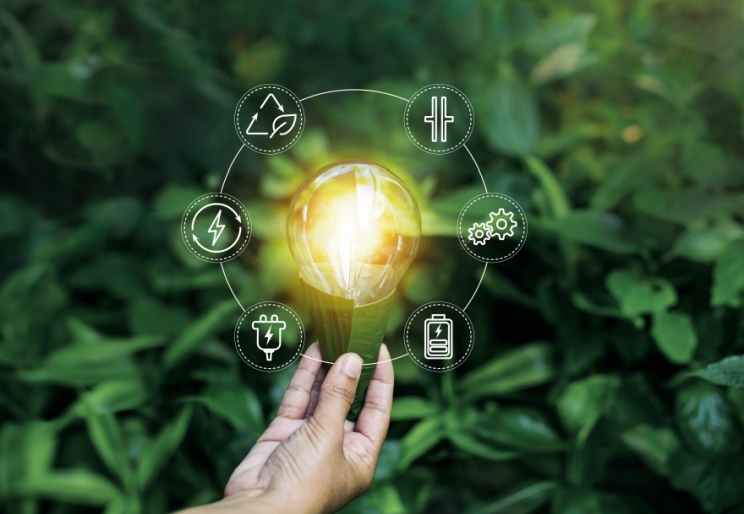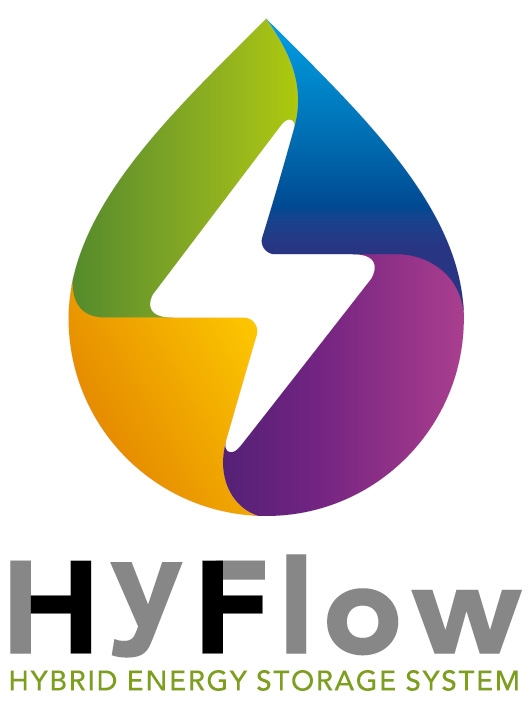
HyFlow

The best of two systems: Development of a new hybrid energy storage system
The transition to CO2-neutral electricity generation poses a major challenge for Europe's energy grids. Ground-breaking developments in the material and design sector of energy storage systems are required to compensate for generation and load peaks in renewable energy sources. Addressing this challenge and reducing dependence on fossil fuels requires flexible storage systems tailored to a wide range of applications.
High storage capacity and high performance
The HyFlow project aims to develop a powerful model for a hybrid energy storage system (HESS) that can meet high energy and power requirements. The project thus contributes to ensuring the effectiveness and security of supply for energy grids in the future.
To this end, researchers target the combination of two different systems – high-performance vanadium redox flow batteries and supercapacitors. "A redox flow battery has a large storage capacity, but can only be charged and discharged slowly. The supercapacitor, on the other hand, has short charging times with low energy density. The hybridisation is intended to create an energy storage system that combines the advantages of both systems: high storage capacity and high performance", says Prof. Karl-Heinz Pettinger, Scientific Director of the Technology Centre for Energy at Landshut University of Applied Sciences, who coordinates the project. Altogether, eleven partners from Germany, Italy, Spain, the Czech Republic, Austria, Portugal and Russia are involved in HyFlow.
Powerful, sustainable and cost-effective
In the future, the newly developed storage system will be able to flexibly offset the power and energy requirements in critical grid conditions, e. g. at high load or generation peaks, over seconds or whole days. In these demanding applications, hybridization leads to more efficient storage systems with longer service life and high adaptability – potentially even at a lower cost. To ensure that it is as environmentally friendly and sustainable as possible, the new hybrid system does not use critical resources. Researchers are developing strategies to recycle vanadium for redox flow batteries.
Increasing Europe's competitiveness in the battery sector
The use of optimised components for hybrid systems guarantees security of supply for energy grid systems – with increased current density, efficiency and service life. In addition, an innovative management system provides a high level of control and adaptability through computer analytics and control algorithms. The HyFlow project thus supports Europe's competitiveness in the battery sector for stationary storage applications.

Project Overview
Project aims and fields of work
The aim of the HyFlow project is to develop a high-performance demonstrator of a hybrid energy storage system that can meet high energy and power requirements. The project thus contributes to ensuring the effectiveness and security of supply for energy grids in the future.
Target groups
- Researchers in the field of battery and supply technology as well as materials science
- Industrial park operators
- Public utilities
- Manufacturers of batteries and energy storage solutions
- IT system integration
BayFOR as a partner
The Bavarian Research Alliance supported the project with intensive technical application support (conceptual design), proofreading, budget calculation and contract preparation.
BayFOR handles administrative project management and communication activities during the ongoing project.
Funding
From November 2020 to February 2024, the HyFlow project will receive funding of EUR 3.9 million under Horizon 2020, the EU Framework Programme for Research and Innovation, in accordance with grant agreement No. 963550. Of this, EUR 1 million goes to Bavarian stakeholders.
Consortium
In the HyFlow project, 11 partners from Germany, Italy, Spain, the Czech Republic, Austria, Portugal and Russia work together under the coordination of Landshut University of Applied Sciences.
Coordinator:
Technology Centre for Energy (TZE), Landshut University of Applied Sciences, Germany
Partners:
Pinflow energy storage s.r.o., Czech Republic
Epic Power, Spain
Fraunhofer Institute for Chemical Technology, Germany
C2C-NewCap, Portugal
Skolkovo Institute of Science and Technology, Russia
Karlsruhe Institute of Technology, Germany
Freqcon, Germany
Energieinstitut Linz, Austria
Università di Bologna, Italy
Bavarian Research Alliance, Germany
Further information
Internet: www.HyFlow-H2020.eu
Contacts at Landshut University of Applied Sciences

Prof. Dr Karl-Heinz Pettinger
Scientific Director | HyFlow Project Coordinator
Phone: +49 (0)8531 – 914044 11
Email: karl-heinz.pettinger@no-spam-pleasehaw-landshut.de
Contact at BayFOR

Dr. Daniel Kießling
Scientific Officer Information & Communication Technologies |
Engineering & Natural Sciences
Phone: +49 911 50715-920
Email: kiessling@no-spam-pleasebayfor.org

MBA Gabriela Blumberger
Scientific Officer Information & Communication Technologies | Engineering & Natural Sciences and Project Manager
Phone: +49 89 9901888-132
Email: blumberger@no-spam-pleasebayfor.org




